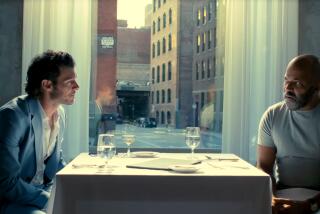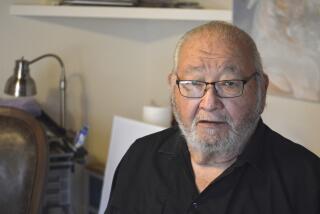First Fiction
- Share via
EUREKA, Calif., is just about the westernmost city in the continental United States. In “The Loss of Leon Meed,” an audaciously ambitious first novel by Josh Emmons, Eureka is out there not only geographically but in other key ways too: It’s a place brimming over with the stuff that made Northern California famous, from gravity bongs to guava juice to save-the-local-waterfowl protests (in Eureka’s case, the Pacific black brant).
It’s also a distressed American town, full of boozy dive bars and equally boozy citizens riding out their days on the continental edge the same dreary way that anyone in, say, Ashtabula, Ohio, would. And Eureka just happens to be the site of an extremely odd phenomenon, in which Leon Meed, a middle-aged maker of burled wood sculpture, goes missing, only to reappear for fleeting moments around the city, like a living ghost, before disappearing back into the ether.
It’s an outlandish premise, the kind intended to signal, in no uncertain terms, a high-wire act. But Emmons isn’t merely determined to dazzle with weirdness. “The Loss of Leon Meed” is a canny status report on the American soul, with an Altman-esque cast.
There’s the orthopedist Greg Souza and his schoolteacher wife, Elaine Perry, whose marriage implodes when Greg -- an inveterate horndog -- takes up with a nurse, while Elaine succumbs to the sleazy advances of her boss at Muir Elementary.
There’s Silas Carlton, Eureka’s beloved 75-year-old curmudgeon, a guy who looks like Samuel Beckett and drinks alarming amounts of coffee at the diner. His 17-year-old great-niece, Lillith Fielding, is a burger flipper at McDonald’s and an avowed Wiccan.
Prentiss Johnson, “as black as any Eurekan could ever ... be,” shelves books at the public library and grapples with the temptations of alcohol. The host of radio station KHSU’s “Live from Somewhere,” Barry Klein, is in the midst of rapaciously coming out of the closet. Joon-sup Kim, a dreadlocked Korean American, dreams of opening his own barbecue restaurant called the Joon-sup Experience.
And Shane Larson is a Bud Light-fueled Mormon who favors hard-sell tactics -- and occasional physical violence -- as he hawks burial plots for the Morland Memorial Services company: “Imagine a place on the hill there, overlooking the bay, in a gorgeous casket made of beautifully contrasting white pine and mahogany, and with a crisp gold satin lining.... Can you imagine how good you’d feel?”
The assorted Eurekans on this far-from-complete roster share one thing in common: They have all seen Leon Meed. The missing sculptor materializes at the Fricatash Club during a set by the rock band Derivative, on a crowded highway (forcing Joon-sup to slam on his brakes) and in the Pacific (Silas and Elaine attempt to save him). He’s the tenuous thread that holds Emmons’ eccentric tapestry together, providing the evanescent connection among Eureka’s splintering citizenry.
Of course, there are as many interpretations of the Meed phenomenon as there are Eurekans: The ostentatious disappearing act is conjectured variously as mental illness, performance art and, as Lillith insists, a kidnapping “by a god named the Horned Consort” that has whisked Meed off to the astral plane.
Even a written account left behind by Meed -- who dies of natural causes 10 years after he begins popping up randomly around Eureka -- reveals few details. “The Loss of Leon Meed” is similarly inconclusive, in ways both tantalizing and unsatisfying. You get the sense of a novel gunning to sum up America the way “The Corrections” or “Gravity’s Rainbow” did, shot through with the antic impulses of Jonathan Safran Foer and Donald Antrim, and even a touch of Frank Capra.
But, like Meed’s life-size burl statuary, this engaging, enigmatic and at times irritating novel is something of an overblown tchotchke whose ultimate effect remains elusive. Maybe that’s the whole idea. “[S]tories, like all copies of a lost original,” Emmons’ narrator tells us, “leave out more than they include.” An easy out, perhaps, but yet another compelling theory into the strange case of Leon Meed, a hapless man who -- poor soul -- is made to embody not only the abundant disconnects of small-town America, but of storytelling itself.
More to Read
Sign up for our Book Club newsletter
Get the latest news, events and more from the Los Angeles Times Book Club, and help us get L.A. reading and talking.
You may occasionally receive promotional content from the Los Angeles Times.










